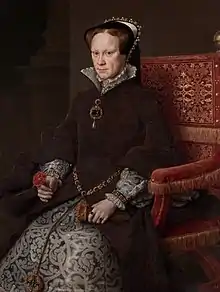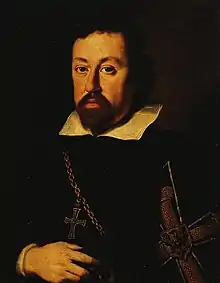1558
Year 1558 (MDLVIII) was a common year starting on Saturday (link will display the full calendar) of the Julian calendar.
| Millennium: | 2nd millennium |
|---|---|
| Centuries: | |
| Decades: | |
| Years: |
| 1558 by topic |
|---|
| Arts and science |
| Leaders |
|
| Birth and death categories |
| Births – Deaths |
| Establishments and disestablishments categories |
| Establishments – Disestablishments |
| Works category |
|
| Gregorian calendar | 1558 MDLVIII |
| Ab urbe condita | 2311 |
| Armenian calendar | 1007 ԹՎ ՌԷ |
| Assyrian calendar | 6308 |
| Balinese saka calendar | 1479–1480 |
| Bengali calendar | 965 |
| Berber calendar | 2508 |
| English Regnal year | 4 Ph. & M. – 1 Eliz. 1 |
| Buddhist calendar | 2102 |
| Burmese calendar | 920 |
| Byzantine calendar | 7066–7067 |
| Chinese calendar | 丁巳年 (Fire Snake) 4254 or 4194 — to — 戊午年 (Earth Horse) 4255 or 4195 |
| Coptic calendar | 1274–1275 |
| Discordian calendar | 2724 |
| Ethiopian calendar | 1550–1551 |
| Hebrew calendar | 5318–5319 |
| Hindu calendars | |
| - Vikram Samvat | 1614–1615 |
| - Shaka Samvat | 1479–1480 |
| - Kali Yuga | 4658–4659 |
| Holocene calendar | 11558 |
| Igbo calendar | 558–559 |
| Iranian calendar | 936–937 |
| Islamic calendar | 965–966 |
| Japanese calendar | Kōji 4 / Eiroku 1 (永禄元年) |
| Javanese calendar | 1477–1478 |
| Julian calendar | 1558 MDLVIII |
| Korean calendar | 3891 |
| Minguo calendar | 354 before ROC 民前354年 |
| Nanakshahi calendar | 90 |
| Thai solar calendar | 2100–2101 |
| Tibetan calendar | 阴火蛇年 (female Fire-Snake) 1684 or 1303 or 531 — to — 阳土马年 (male Earth-Horse) 1685 or 1304 or 532 |
Events

November 17: Accession of Queen Elizabeth I of England.
January–June
- January 7 – French troops, led by Francis, Duke of Guise, take Calais, the last continental possession of the Kingdom of England, in the Siege of Calais.
- January 22 – The Livonian War begins.
- February 2 – The University of Jena is founded in Thuringia, Germany.
- February 5 – Arauco War: Pedro de Avendaño, with sixty men, captures Caupolicán (the Mapuche Gran Toqui), who is leading their first revolt against the Spanish Empire (near Antihuala), encamped with a small band of followers.
- March 8 – The city of Pori (Swedish: Björneborg) was founded by Duke John on the shores of the Gulf of Bothnia.[1]
- April 24 – Mary, Queen of Scots, marries Francis, Dauphin of France, at Notre Dame de Paris.
July–December
- July 13 – Battle of Gravelines: In France, Spanish forces led by Lamoral, Count of Egmont defeat the French forces of Marshal Paul de Thermes.
- July 18 – The city of Tartu, capital of the Bishopric of Dorpat (in modern-day Estonia) surrenders to Russia.
- October 17 – Postal history of Poland: King Sigismund II Augustus appoints an Italian merchant living in Kraków to organise a consolidated postal service in Poland, the origin of Poczta Polska.
- November 17 – Catholic Queen Mary I dies, and is succeeded by her younger Protestant half-sister Elizabeth I, beginning the Elizabethan era in England.
Unknown
- John Knox's attack on female rulers, The First Blast of the Trumpet Against the Monstruous Regiment of Women, is published anonymously from Geneva.[2]
- English explorer Anthony Jenkinson travels from Moscow to Astrakhan and Bukhara.[3] He is the first Englishman to note that the Amu Darya changed course, to start flowing into the Aral Sea.[4]
- Queen Elizabeth I of England grants rest and refreshment to pilgrims and travellers who pass by the Holy Well Spring at Malvern in England.
Ongoing
Births
- January or February – Hendrik Goltzius, Dutch painter (d. 1617)
- January 16 – Jakobea of Baden, Margravine of Baden by birth, Duchess of Jülich-Cleves-Berg by marriage (d. 1597)
- January 29 – Paul Hentzner, German lawyer (d. 1623)
- March 7 – Johann VII, Duke of Mecklenburg, Duke of Mecklenburg-Schwerin (1576–1592) (d. 1592)
- April 30 – Mikołaj Oleśnicki the younger, Polish noble (d. 1629)
- June 15 – Margrave Andrew of Burgau, German nobleman, Cardinal, Bishop of Constance and Brixen (d. 1600)
- July 9 – David Origanus, German astronomer (d. 1628)
- July 11 – Robert Greene, English dramatist (d. 1592)
- August 2 – Herman van den Bergh, Dutch soldier in the Eighty Years' War (d. 1611)
- August 8 – George Clifford, 3rd Earl of Cumberland, English noble (d. 1605)
- August 19 – François de Bourbon, Prince of Conti (d. 1614)
- September 9 – Philippe Emmanuel, Duke of Mercœur, French soldier (d. 1602)
- September 24 – Ralph Eure, 3rd Baron Eure, English politician (d. 1617)
- October 12 – Maximilian III, Archduke of Austria (d. 1618)
- October 24 – Szymon Szymonowic, Polish writer (d. 1629)
- October 30 – Jacques-Nompar de Caumont, duc de La Force, Marshal of France (d. 1652)
- November 27 – Mingyi Swa, Crown Prince of Burma (d. 1593)
- December 3 – Gregorio Pagani, Italian painter (d. 1605)
- December 8 – François de La Rochefoucauld, French Catholic cardinal (d. 1645)
- December 9 – André du Laurens, French physician (d. 1609)
- date unknown
- Meir Lublin, Polish rabbi (d. 1616)
- Kōriki Masanaga, Japanese military commander (d. 1599)
- Bessho Nagaharu, Japanese nobleman (d. 1580)
- Olivier van Noort, first Dutchman to circumnavigate the world (d. 1627)
- Chidiock Tichborne, English conspirator and poet (d. 1586)
- Michael the Brave, Prince of Wallachia (1593–1601) (d. 1601)
- Thomas Kyd, English playwright (d. 1594)
- Françoise de Cezelli, French war hero (d. 1615)
- probable - Pierre Dugua, Sieur de Mons, French merchant (d. 1628)
Deaths

Emperor Charles V


- January 28 – Jacob Micyllus, German humanist (b. 1503)
- February 25 – Eleanor of Austria, Queen of Portugal and France (b. 1498)
- February 27
- Johann Faber of Heilbronn, controversial Catholic preacher (b. 1504)
- Kunigunde of Brandenburg-Kulmbach, German noblewoman (b. 1524)
- March 6 – Luca Gaurico, Italian astrologer (b. 1475)
- March 24 – Anna van Egmont, Countess of Egmond and Buren (b. c. 1533)
- March 25 – Marcos de Niza, French Franciscan explorer (b. c. 1495)
- April 2 – Wolfgang of the Palatinate, Count Palatine of Neumarkt (b. 1494)
- April 15 – Hurrem Sultan, Ruthenian-born wife of Suleiman the Magnificent (b. c. 1500)
- April 20 – Johannes Bugenhagen, German reformer (b. 1485)
- April 26 – Jean Fernel, French physician (b. 1497)[5]
- May 17 – Francisco de Sá de Miranda, Portuguese poet (b. 1485)
- May 19 – Juan Téllez-Girón, 4th Count of Ureña, Spanish count (b. 1494)
- May 25 – Elisabeth of Brandenburg, Duchess of Brunswick-Calenberg-Göttingen (1525–1540) (b. 1510)[6]
- May 31 – Philip Hoby, English politician (b. 1505)
- June 28 – Thomas Darcy, 1st Baron Darcy of Chiche, English courtier (b. 1506)
- July 17 – George I of Württemberg-Mömpelgard (b. 1498)
- August 11 – Justus Menius, German Lutheran pastor (b. 1499)[7]
- September 21 – Charles V, Holy Roman Emperor (b. 1500)[8]
- October – Mellin de Saint-Gelais, French poet (b. c. 1491)
- October 18 – Maria of Austria, queen of Louis II of Hungary and Bohemia (b. 1505)
- October 21 – J. C. Scaliger, Italian scholar (b. 1484)[9]
- November 1
- Anne Brooke, Baroness Cobham, English noble (b. 1501)
- Erhard Schnepf, German theologian (b. 1495)
- November 15 – Gilbert Kennedy, 3rd Earl of Cassilis, Scottish politician and judge (b. 1515)
- November 17
- (bur.) Hugh Aston, English composer (b. 1485)
- Queen Mary I of England (b. 1516)[10]
- Reginald Pole, Cardinal Archbishop of Canterbury (b. 1500)
- December 7 – Johann Forster, German theologian (b. 1496)
- December 16 – Thomas Cheney, Lord Warden of the Cinque Ports (b. c. 1485)
- December 19 – Cornelius Grapheus, Flemish writer (b. 1482)
- December 28 – Hermann Finck, German composer (b. 1527)
- date unknown
- Archibald Campbell, 4th Earl of Argyll, Scottish nobleman and politician (b. 1507)
- Robert Recorde, Welsh physician and mathematician (b. c. 1512)
References
- J. W. Ruuth (1958). "Kaupungin perustamiskirje". Porin kaupungin historia II (in Finnish). City of Pori. p. 269.
- Lillian S. Robinson (1985). Monstrous Regiment: The Lady Knight in Sixteenth-century Epic. Garland Pub. p. 112. ISBN 978-0-8240-6709-0.
- Grun, Bernard (1991). The Timetables of History (3rd ed.). New York: Simon & Schuster. p. 247. ISBN 0-671-74919-6.
- Sykes, Percy (1921). A History of Persia. London: Macmillan and Company. p. 64.
- BONO, JAMES J.; SCHMITT, CHARLES B. (1979). "AN UNKNOWN LETTER OF JACQUES DALÉCHAMPS TO JEAN FERNEL: LOCAL AUTONOMY VERSUS CENTRALIZED GOVERNMENT" (PDF). Bulletin of the History of Medicine. 53 (1): 100–127. ISSN 0007-5140. JSTOR 44451300. PMID 387127. Archived (PDF) from the original on October 9, 2022.
- Wilson, Katharina M. (1991). An Encyclopedia of Continental Women Writers. Taylor & Francis. p. 200. ISBN 978-0-8240-8547-6.
- Friedrich Bente (2005). Historical Introductions to the Lutheran Confessions: As Contained in the Book of Concord of 1580. Concordia Publishing House. p. 132. ISBN 978-0-7586-0921-2.
- "Charles V | Accomplishments, Reign, Abdication, & Facts". Encyclopedia Britannica. Retrieved January 14, 2021.
- Vernon Hall (December 2007). Life of Julius Caesar Scaliger (1484-1558): Transactions, APS. American Philosophical Society. p. 158. ISBN 978-1-4223-7704-8.
- Jane Resh Thomas (1998). Behind the Mask: The Life of Queen Elizabeth I. Houghton Mifflin Harcourt. p. 73. ISBN 0-395-69120-6.
This article is issued from Wikipedia. The text is licensed under Creative Commons - Attribution - Sharealike. Additional terms may apply for the media files.

.jpg.webp)
